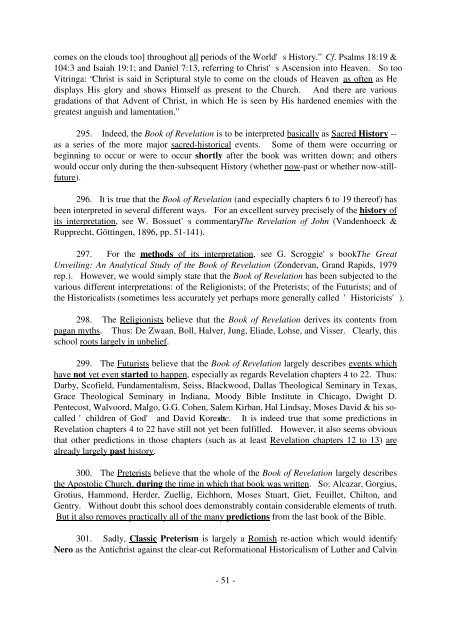JERUSALEM; ROME; REVELATION - The Preterist Archive
JERUSALEM; ROME; REVELATION - The Preterist Archive
JERUSALEM; ROME; REVELATION - The Preterist Archive
You also want an ePaper? Increase the reach of your titles
YUMPU automatically turns print PDFs into web optimized ePapers that Google loves.
comes on the clouds too] throughout all periods of the World's History.” Cf. Psalms 18:19 &<br />
104:3 and Isaiah 19:1; and Daniel 7:13, referring to Christ's Ascension into Heaven. So too<br />
Vitringa: “Christ is said in Scriptural style to come on the clouds of Heaven as often as He<br />
displays His glory and shows Himself as present to the Church. And there are various<br />
gradations of that Advent of Christ, in which He is seen by His hardened enemies with the<br />
greatest anguish and lamentation.”<br />
295. Indeed, the Book of Revelation is to be interpreted basically as Sacred History --<br />
as a series of the more major sacred-historical events. Some of them were occurring or<br />
beginning to occur or were to occur shortly after the book was written down; and others<br />
would occur only during the then-subsequent History (whether now-past or whether now-stillfuture).<br />
296. It is true that the Book of Revelation (and especially chapters 6 to 19 thereof) has<br />
been interpreted in several different ways. For an excellent survey precisely of the history of<br />
its interpretation, see W. Bossuet's commentary <strong>The</strong> Revelation of John (Vandenhoeck &<br />
Rupprecht, Göttingen, 1896, pp. 51-141).<br />
297. For the methods of its interpretation, see G. Scroggie's book <strong>The</strong> Great<br />
Unveiling: An Analytical Study of the Book of Revelation (Zondervan, Grand Rapids, 1979<br />
rep.). However, we would simply state that the Book of Revelation has been subjected to the<br />
various different interpretations: of the Religionists; of the <strong>Preterist</strong>s; of the Futurists; and of<br />
the Historicalists (sometimes less accurately yet perhaps more generally called 'Historicists').<br />
298. <strong>The</strong> Religionists believe that the Book of Revelation derives its contents from<br />
pagan myths. Thus: De Zwaan, Boll, Halver, Jung, Eliade, Lohse, and Visser. Clearly, this<br />
school roots largely in unbelief.<br />
299. <strong>The</strong> Futurists believe that the Book of Revelation largely describes events which<br />
have not yet even started to happen, especially as regards Revelation chapters 4 to 22. Thus:<br />
Darby, Scofield, Fundamentalism, Seiss, Blackwood, Dallas <strong>The</strong>ological Seminary in Texas,<br />
Grace <strong>The</strong>ological Seminary in Indiana, Moody Bible Institute in Chicago, Dwight D.<br />
Pentecost, Walvoord, Malgo, G.G. Cohen, Salem Kirban, Hal Lindsay, Moses David & his socalled<br />
'children of God' and David Koresh etc. It is indeed true that some predictions in<br />
Revelation chapters 4 to 22 have still not yet been fulfilled. However, it also seems obvious<br />
that other predictions in those chapters (such as at least Revelation chapters 12 to 13) are<br />
already largely past history.<br />
300. <strong>The</strong> <strong>Preterist</strong>s believe that the whole of the Book of Revelation largely describes<br />
the Apostolic Church, during the time in which that book was written. So: Alcazar, Gorgius,<br />
Grotius, Hammond, Herder, Zuellig, Eichhorn, Moses Stuart, Giet, Feuillet, Chilton, and<br />
Gentry. Without doubt this school does demonstrably contain considerable elements of truth.<br />
But it also removes practically all of the many predictions from the last book of the Bible.<br />
301. Sadly, Classic Preterism is largely a Romish re-action which would identify<br />
Nero as the Antichrist against the clear-cut Reformational Historicalism of Luther and Calvin<br />
- 51 -
















